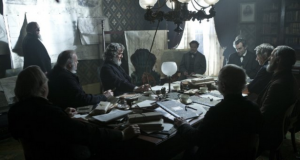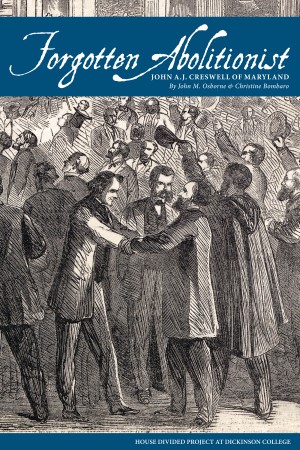GO TO “LINCOLN” MOVIE TEACHER’S GUIDE
INTRODUCTION
 Early in the “Lincoln” movie (Scene 7), President Lincoln provides a lengthy defense of his wartime emancipation policy to his Cabinet when he encounters some objections to the move toward abolition from Secretary of Interior John P. Usher. Read the following excerpt closely and try to identify Lincoln’s key arguments:
Early in the “Lincoln” movie (Scene 7), President Lincoln provides a lengthy defense of his wartime emancipation policy to his Cabinet when he encounters some objections to the move toward abolition from Secretary of Interior John P. Usher. Read the following excerpt closely and try to identify Lincoln’s key arguments:
CLOSE READING ASSIGNMENT
LINCOLN:
I decided that the Constitution gives me war powers, but no one
knows just exactly what those powers are. Some say they don’t
exist. I don’t know. I decided I needed them to exist to uphold my
oath to protect the Constitution, which I decided meant that I could
take the rebels’ slaves from ‘em as property confiscated in war. That
might recommend to suspicion that I agree with the rebs that their
slaves are property in the first place. Of course I don’t, never
have, I’m glad to see any man free, and if calling a man property, or
war contraband, does the trick… Why I caught at the opportunity.
Now here’s where it gets truly slippery. I use the law allowing
for the seizure of property in a war knowing it applies only to the
property of governments and citizens of belligerent nations.
But the South ain’t a nation, that’s why I can’t negotiate with
’em. So if in fact the Negroes are property according to law, have I
the right to take the rebels’ property from ‘em, if I insist
they’re rebels only, and not citizens of a belligerent country?
And slipperier still: I maintain it ain’t our actual Southern states in
rebellion, but only the rebels living in those states, the laws of
which states remain in force. The laws of which states remain in
force. That means, that since it’s states’ laws that determine whether
Negroes can be sold as slaves, as property – the Federal government
doesn’t have a say in that, least not yet – (a glance at Seward,
then:)- then Negroes in those states are slaves, hence property, hence my
war powers allow me to confiscate ‘em as such. So I confiscated ‘em.
But if I’m a respecter of states’ laws, how then can I legally free
‘em with my Proclamation, as I done, unless I’m cancelling states’
laws? I felt the war demanded it; my oath demanded it; I felt right
with myself; and I hoped it was legal to do it, I’m hoping still.
(Tony Kushner, “Lincoln,” p. 26-7)
GUIDING QUESTIONS
After you have organized an outline or chart of Lincoln’s key arguments in this passage, try to answer the following questions:
1. In the context of the Civil War, what is the meaning of the following words or phrases: war powers, confiscation, contraband, and belligerent? Are there other words in the excerpt that need definition?
2. How does Lincoln describe the process which was leading him to conclude that only a constitutional amendment could truly end slavery in the United States?
3. Why was the problem of ending slavery during the Civil War so “slippery” as Lincoln describes it? Were the obstacles that Lincoln is describing here mainly political, legal or social?
SHORT WRITING ASSIGNMENT
The passage attributed to Lincoln in this script is not something he actually said, but has been imagined by the scriptwriter Tony Kushner to represent various arguments in favor of emancipation policy that President Lincoln and his supporters used during the course of the Civil War. Consider the following real quotations from Abraham Lincoln and compose a short informational essay that tries to explain how the script seems to be summarizing aspects of these historical statements:
Abraham Lincoln’s First Inaugural Address, March 4, 1861
“Apprehension seems to exist among the people of the Southern States that by the accession of a Republican Administration their property and their peace and personal security are to be endangered. There has never been any reasonable cause for such apprehension. Indeed, the most ample evidence to the contrary has all the while existed and been open to their inspection. It is found in nearly all the published speeches of him who now addresses you. I do but quote from one of those speeches when I declare that—
I have no purpose, directly or indirectly, to interfere with the institution of slavery in the States where it exists. I believe I have no lawful right to do so, and I have no inclination to do so.
Abraham Lincoln’s Special Message to Congress, July 4, 1861
“Lest there be some uneasiness in the minds of candid men as to what is to be the course of the Government towards the southern States after the rebellion shall have been suppressed, the Executive deems it proper to say, it will be his purpose then, as ever, to be guided by the Constitution and the laws; and that he probably will have no different understanding of the powers and duties of the Federal Government relative to the rights of the States and the people, under the Constitution than that expressed in the inaugural address.”
Abraham Lincoln to James C. Conkling, August 26, 1863
“I think the constitution invests its Commander-in-chief, with the law of war, in time of war. The most that can be said, if so much, is, that slaves are property. Is there–has there ever been–any question that by the law of war, property, both of enemies and friends, may be taken when needed? And is it not needed whenever taking it, helps us, or hurts the enemy?”
Abraham Lincoln to Albert Hodges, April 4, 1864
“I have done no official act in mere deference to my abstract judgment and feeling on slavery. I did understand however, that my oath to preserve the constitution to the best of my ability, imposed upon me the duty of preserving, by every indispensable means, that government—that nation—of which that constitution was the organic law. Was it possible to lose the nation, and yet preserve the constitution? By general law life and limb must be protected; yet often a limb must be amputated to save a life; but a life is never wisely given to save a limb. I felt that measures, otherwise unconstitutional, might become lawful, by becoming indispensable to the preservation of the constitution, through the preservation of the nation. Right or wrong, I assumed this ground, and now avow it.”
ANOTHER VIEW
From Matthew Pinsker, Director, House Divided Project:
Not every historian would accept the way Tony Kushner conveys Lincoln’s views. One of the biggest arguments concerns this question of “confiscating” slaves as property in order to free them. According to the script, Lincoln denies that slaves should ever be considered as property but admits that he “caught at the opportunity” in order to set in motion his emancipation policy. On the surface, this appears to be what he wrote to Conkling in 1863 (“The most that can be said, if so much, is, that slaves are property,”) but a careful reading of that document –especially in context– suggests that was not what he believed or what he actually did –but rather he was saying this was what even his political enemies had to concede if that was truly their belief (“The most that can be said…”).
What the script does not quite have the space to explain is that “confiscation” was a congressional policy, created in two separate laws (August 6, 1861 and July 17, 1862) that ultimately authorized the president to make rebel-owned slaves “forever free.” This was the real trigger for Lincoln’s initial emancipation decision in July 1862. However, congressional confiscation made a careful distinction between punishing rebels by confiscating their real property (such as their plantations) and by freeing their slaves. The confiscation law treated these enslaved people not as property but explicitly as “captives of war.” In other words, federal law never recognized the principle of property in man. Only states laws did that. This is a critical insight made clear in James Oakes’s book, Freedom National (2012) and which is documented here in this Emancipation Digital Classroom. This also helps explain why the Emancipation Proclamation refers to “persons held as slaves,” and does nothing to recognize them as property or to invoke asset forfeiture law in order to “seize” them. Instead, the proclamation calls their freedom “an act of justice,” and addresses them directly as people with natural rights. See this video from Matthew Pinsker for a more complete explanation of that point.
The script also appears to make a mistake by having Lincoln assert that the laws of the states in rebellion remained “in force.” This was never his view. In fact, almost all of the extraordinary presidential measures he embraced from the beginning of the war until its conclusion –whether it was calling forth the militias, suspending habeas corpus, emancipating slaves, or setting conditions for reconstruction– were done in the name of substituting executive action for laws that were clearly not in force. When President Lincoln invoked the international “laws of war” as Commander-in-Chief, he was able to do so to suppress a domestic rebellion. Some measures –such as setting foot a blockade– did suggest implicit recognition of Confederate sovereignty– but even as Lincoln was denying that sovereignty in public, he was never claiming to be bound by southern state laws during a time of armed rebellion. According to Lincoln, Confederate states were neither independent of nor controlled by the federal government during the Civil War. They were quite literally “in rebellion” and subject to the laws of war.
DISCUSSION QUESTIONS
What do you think about these sometimes highly technical arguments over the Constitution and international law during times of war? Do they sound like unnecessary legal hair-splitting? Or does the depth and complexity of this debate reflect the enduring importance of constitutional law in American history?
Common Core Alignments
Grades 6-8
- CCSS.ELA-Literacy.RH.6-8.1 Cite specific textual evidence to support analysis of primary and secondary sources.
- CCSS.ELA-Literacy.RH.6-8.2 Determine the central ideas or information of a primary or secondary source; provide an accurate summary of the source distinct from prior knowledge or opinions.
- CCSS.ELA-Literacy.RH.6-8.3 Identify key steps in a text’s description of a process related to history/social studies (e.g., how a bill becomes law, how interest rates are raised or lowered).
Grades 9-10
- CCSS.ELA-Literacy.RH.9-10.1 Cite specific textual evidence to support analysis of primary and secondary sources, attending to such features as the date and origin of the information.
- CCSS.ELA-Literacy.RH.9-10.4 Determine the meaning of words and phrases as they are used in a text, including vocabulary describing political, social, or economic aspects of history/social science.
- CCSS.ELA-Literacy.RH.9-10.5 Analyze how a text uses structure to emphasize key points or advance an explanation or analysis.
- CCSS.ELA-Literacy.RH.9-10.6 Compare the point of view of two or more authors for how they treat the same or similar topics, including which details they include and emphasize in their respective accounts.
Grades 11-12
- CCSS.ELA-Literacy.RH.11-12.1 Cite specific textual evidence to support analysis of primary and secondary sources, connecting insights gained from specific details to an understanding of the text as a whole.
- CCSS.ELA-Literacy.RH.11-12.2 Determine the central ideas or information of a primary or secondary source; provide an accurate summary that makes clear the relationships among the key details and ideas.
- CCSS.ELA-Literacy.RH.11-12.3 Evaluate various explanations for actions or events and determine which explanation best accords with textual evidence, acknowledging where the text leaves matters uncertain.
GO TO “LINCOLN” MOVIE TEACHER’S GUIDE

